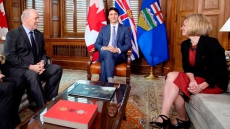OTTAWA — Prime Minister Justin Trudeau might see his country as a beacon of hope in a roiling sea of polarization and angry nationalist sentiment, but Canada is far from immune, experts warn.
Just as he did Tuesday at the French National Assembly, Trudeau likes to portray Canada as a place where progressive values flourish — free trade, ethic diversity, immigration, environmental protection and gender equality.
"At a time when the political movements exploit the real anxiety of their citizens, Canada has chosen to be against cynicism and embrace audacity and ambition," he said.
A sizable proportion of the Canadian public believes otherwise, research suggests.
Ekos Research and The Canadian Press teamed up earlier this year to gauge populist sentiment in Canada. Fewer than half of respondents — 46 per cent — expressed views that reflected an open-minded perspective of the world and each other, while 30 per cent landed in the "ordered" category, which means feeling economically and culturally insecure. 25 per cent expressed "mixed" views.
The survey, an aggregation of polls conducted with more than 12,000 Canadians, carried a margin of error of plus or minus 0.9 percentage points, 19 times out of 20. Its results suggested there is indeed fertile ground in Canada for a populist movement to take hold.
Canada has largely staved off the negative politics of pessimism and xenophobia that are major areas of concern in the U.S. and parts of Europe, said Ekos president Frank Graves. But that doesn't mean populist sentiment isn't brewing north of the border.

"Those forces are very much at work," Graves said, noting the icy reaction to Trudeau's remarks from right-wing National Front leader Marine Le Pen.
"Those forces are by no means extinguished in France and we see them definitely evident in Canada as well."
Graves cited Ontario Conservative Leader Doug Ford as an example of a political leader who speaks the language of the ordered, populist view, with campaign rhetoric that blames his Liberal rivals for the economic insecurity plaguing those who are struggling.
Graves also mentioned recent electoral victories in Hungary and Italy by polarizing populist parties that show populism is on the march.
"Canada did seem to be picking a different path on things like xenophobia and trade and immigration," he said of his findings.
"However, there was still a very sizable, very engaged portion of the public that were not buying into this at all... this is by no means a settled issue yet."
University of Amsterdam researcher Mike Medeiros, who specializes in ethnopolitics, political behaviour and political psychology, pointed to immigration as an issue that could become a flashpoint in Canada.
Spurred in part by fear of a crackdown from U.S. President Donald Trump, illegal migrants have been streaming over the border into Ontario and Quebec in hopes of seeking asylum in Canada.
All it would take is a charismatic leader to come along and exploit such issues to bring nativist sentiment in Canada to a boil, he said.
"If (Trudeau) is expressing simply that Canada is different, fine, that's fair, because Canada is different — or at least it has been so far," Medeiros said.
"But if he is expressing that, 'We do not have these concerns,' that is not accurate."




